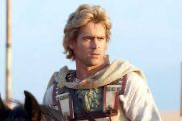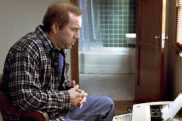Steven Pressfield's Blog, page 31
October 21, 2020
Alexander the Great and the Two Levels
I felt at home in Egypt. I could happily have been a priest. In truth I am a warrior-priest, who marches where God directs him, in the service of Necessity and Fate. Nor is such a notion vain or self-infatuated. Consider: Persia’s time has passed. In the Invisible World, Darius’ empire has already fallen. Who am I, except the agent of that end, which already exists in the Other World and at whose birth I assist in this one?
This passage is from The Virtues of War, spoken by Alexander (or my imagined version of him.)
 Colin Farrell in Oliver Stone’s “Alexander”
Colin Farrell in Oliver Stone’s “Alexander”What has always fascinated me about the character of Alexander the Great is that he seemed to see the future with such clarity (and such conviction) as to not only make others see it and believe in it as powerfully as he did, but also to make it virtually impossible that that future would not come true—and that he would be the one to make it do so.
Did Alexander really overthrow the Persian Empire against all odds and in the face of history? Or was that chapter nearing its close … and he perceived this and acted to turn the page?
That’s you and me at the inception of a creative project.
The book/screenplay/non-profit/startup already exists in the Other World.
Your job and mine is to see it, to believe in it, and to bring it forth in this one.
The post Alexander the Great and the Two Levels first appeared on Steven Pressfield.
October 19, 2020
Episode Nineteen: “Women The Equal Of Men”
We’ve all seen “Wonder Woman” and thought it was cool.
But was there really a race of warrior women?
Did they really sear off the right breast so the arm would grow strong to draw the bow and sling the double-bladed axe?
Were the Amazons really the greatest force on horseback ever?
Did they actually attack Athens … and nearly win?
The post Episode Nineteen: "Women The Equal Of Men" first appeared on Steven Pressfield.
October 15, 2020
Episode Eighteen: “Consider the Character of the Athenians”
On the eve of the great war between Athens and Sparta, a speech was given to the Spartans, warning them of the character of the enemy they were about to take on.
The formidable but stolid, deliberate, and cautious Spartans would soon face the daring, unpredictable, reckless, audacious combatants of Athens.
Which side would win … and to what expedients would it have to sink to achieve victory?
The post Episode Eighteen: "Consider the Character of the Athenians" first appeared on Steven Pressfield.
October 14, 2020
Elizabeth Gilbert’s TED Talk
I was in the middle of writing Eat, Pray, Love, and I fell into one of those sort of pits of despair … [and] I started to think I should just dump this project. But then I remembered Tom [Waits] talking to the open air [when inspiration for a song hit him while he was driving on the freeway and had no way to record it] and I tried it. So I just lifted my face up from the manuscript and I directed my comments to an empty corner of the room. And I said aloud, “Listen you, thing, you and I both know that if this book isn’t brilliant that is not entirely my fault, right? Because you can see that I am putting everything I have into this. If you want it to be better, you’ve got to show up and do your part of the deal. But if you don’t do that, you know what, the hell with it. I’m going to keep writing anyway because that’s my job. And I would please like the record to reflect today that I showed up for my part of the job.”
 Elizabeth Gilbert from her TED talk,”Your Elusive Creative Genius”
Elizabeth Gilbert from her TED talk,”Your Elusive Creative Genius”We spoke in last week’s post of the Material Plane and the Plane of Potentiality. What Elizabeth Gilbert did in line 7 above was to reach out (“cry out” might be closer) from the first level to the second.
If it’s true that
Most of us have two lives. The life we live and the unlived life within us. Between the two stands Resistance …
then what Ms. Gilbert did (and what every writer and artist does every day in their work) is to strive to ascend from the former to the latter.
The “unlived life” was her unwritten book.
The unlived self was the person she was struggling to become, the person who could write that book and get it out there into the real world.
Elizabeth Gilbert was entering the Plane of Potentiality, where Eat, Pray, Love resided in as yet unrealized form … and bringing it forth onto the Material Plane, where you and I could buy it and read it.
That’s the writer’s life.
That’s the war of art.
The post Elizabeth Gilbert's TED Talk first appeared on Steven Pressfield.
October 12, 2020
Episode Seventeen: Rightful Lord of His Own Person
The Greeks gave us democracy, courts of law, philosophy, drama, much more.
But their greatest gift — something that had never existed before, anywhere in the world — was the idea of the autonomous citizen … the free individual who, in Pericles’ phrase, was “the rightful lord of his own person.”
The post Episode Seventeen: Rightful Lord of His Own Person first appeared on Steven Pressfield.
October 8, 2020
Episode Sixteen: “Sire, Remember The Athenians”
The Persian king Darius had never heard of the Greeks, their nations were so distant and so remote on the periphery of his empire.
Then the Athenians burned Sardis, one of the king’s cities.
Thereafter at each evening meal, a servant was instructed to whisper in the monarch’s ear, “Sire, remember the Athenians.”
From this reminder of revenge came wars that went on for centuries and are still shaping our world today.
The post Episode Sixteen: "Sire, Remember The Athenians" first appeared on Steven Pressfield.
October 7, 2020
The Unlived Life
I started The War of Art with this thought:
Most of us have two lives. The life we live, and the unlived life within us. Between the two stands Resistance.
What does that mean? In the deepest metaphysical sense?
It means that our lives exist on two levels.
The first level is the material plane. The practical world. The level of kids and cars and mortgages and taxes.
The second is the plane of potentiality.
The unlived life within us.
The books we might write, the enterprises we might initiate, the realized self we might become.
 Pete Townshend of The Who. The “new boss” and the “old boss” are both within us.
Pete Townshend of The Who. The “new boss” and the “old boss” are both within us.Are you unhappy? Frustrated? Do you engage in rants on Facebook and Twitter? Do you take your anguish out on loved ones, on rivals at work, on shoppers in the produce aisle at Piggly Wiggly? Are you planning on building a bomb-proof shelter? Is QAnon starting to sound reasonable to you?
I’m not saying things aren’t crazy out there.
I’m not saying that dark energies haven’t been loosed upon the world.
I’m as freaked out as the next guy.
But what I am saying is that some of our angst, a portion of our anguish comes not from the travails of the moment, however dire they may be, but from something deeper.
I mean the gap between our lived lives and our unlived lives.
I mean Resistance.
When you and I know … when we feel in our bones the unrealized self we are or could become and know that we’re not living it out … the result is pain. The result is shame and mortification and self-reproach.
What we hate is not our fellow citizens across the political aisle.
What we hate is our own failure to step up to that unlived level.
I’m not saying the time of action isn’t imminent. It may be inevitable that you and I, as citizens of a constitutional republic, will have to stand up and defend the principles our country stands for.
But when that fight is over and we find ourselves still as pissed off and miserable as we were before it started, we might remind ourselves that our deeper struggle—our “war of art”—is against that invisible, insidious, indefatigable negative force whose sole aim is to block the part of us that resides on the Material plane from reaching out and opening itself to the part of ourselves that participates in the Plane of the Potential.
Most of us have two lives. The life we live and the unlived life within us. Between the two stands Resistance.
The post The Unlived Life first appeared on Steven Pressfield.
October 5, 2020
Episode Fifteen: The Agoge: The Education Of A Spartan Boy
Spartan boys were taken from their mothers at age seven and enrolled in “the Upbringing.”
They remained in this School of Hard Knocks till age eighteen, when they officially became warriors and took their place in the phalanx.
Herodotus tells us that Spartans breathed a sigh of relief and gratitude when they went off to war … it was so much easier than the training.
The post Episode Fifteen: The Agoge: The Education Of A Spartan Boy first appeared on Steven Pressfield.
October 1, 2020
Episode Fourteen: The Factory of Fear
Every facet of every warrior code is about one thing and one thing only—Fear.
Codes of honor, loyalty, integrity, love of country, fidelity to a cause.
They all exist as a counterpoise to the imperative of self-preservation built into our bodies, our cells, our flesh … the “factory of fear.”
The post Episode Fourteen: The Factory of Fear first appeared on Steven Pressfield.
September 30, 2020
First Drafts are Killers
You could join the Foreign Legion.
You could cross Antarctica on foot.
Or you could write the first draft of a novel.
Personally, I’d say the first two are easier.
Why?
Because in the first draft (of fiction, of nonfiction, of a screenplay) we are facing the blank page.
 Nicholas Cage confronts the blank page in Charlie Kaufman’s “Adaptation”
Nicholas Cage confronts the blank page in Charlie Kaufman’s “Adaptation”In other words, we’re confronting Resistance in its purest and most merciless form day after day after day.
People ask me sometimes, “When is Resistance strongest?” The answer is easy.
At the start.
The invasion of Europe was hardest on D-Day. The civil rights movement was hardest at the first sit-in.
First drafts are, in their way, even harder because even after we’ve established a beachhead with Chapter One or Act One, we still have the weight of the whole project before us, day after day after day.
The professional arms herself for this ordeal. She steels herself in advance for the task, knowing it’s going to test her like no other aspect of the enterprise.
P.S. I write this post as I’m about to plunge in on a first draft. Full disclosure: I am scared sh*tless.
The post First Drafts are Killers first appeared on Steven Pressfield.



